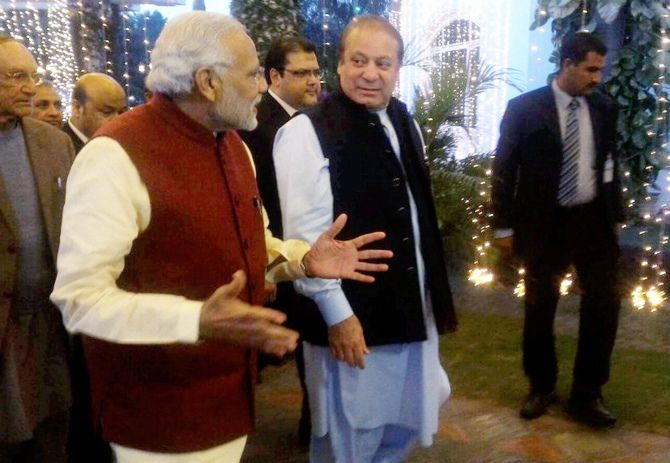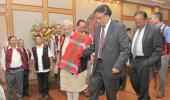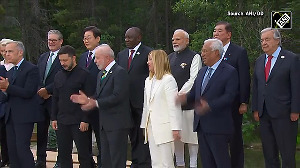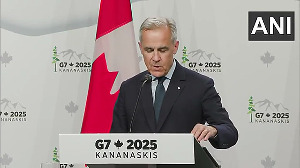'There is a consensus within the Indian security establishment -- at least among those who draw their conclusions from data instead of speaking from nationalist sentiment -- that India lacks the offensive capability to defeat Pakistan in a short war.'

The Pathankot attack is not a spontaneous response to recent developments; it is a manifestation of Pakistan's national security strategy to pursue its revisionist agenda against India, says C Christine Fair, author of Fighting to the End: The Pakistan Army's Way of War, and an associate professor in the Peace and Security Studies Programme at Georgetown University's Edmund A Walsh School of Foreign Service.
Fair, who earlier served as a political officer to the UN Assistance Mission to Afghanistan in Kabul, tells Bhaswar Kumar in a telephonic interview that there is a consensus within the Indian security establishment that India lacks the offensive capability to defeat Pakistan in a short war.
The January 2 attack on an Indian Air Force base in Pathankot was allegedly carried out by Jaish-e-Mohammed operatives. What are the dynamics between organisations like JeM and Pakistan’s military and civilian establishments?
Pakistan's Inter-Services Intelligence set up JeM as a competitor to the Lashkar-e-Tayiba), which the ISI had formed earlier.
Before the formation of JeM, three Pakistani terrorists -- Mushtaq Ahmed Zargar, Ahmed Omar Saeed Sheikh and Maulana Masood Azhar -- were released by Indian authorities in return for hostages taken during the hijacking of the Indian Airlines flight IC-814 in December 1999.
Azhar and the two other terrorists, upon their release in Kandahar, were ferried to Pakistan under ISI escort. Within a few weeks, Azhar announced the formation of JeM in Karachi.
LeT and JeM are ideologically distinct organisations. JeM, like the Afghan and Pakistani Taliban, is Deobandi; LeT is Ahle Hadees.
Besides, JeM generally conducts suicide attacks, while LeT conducts high-risk missions where the goal is not to die, but its operatives would still rather die than be taken captives.
These terrorist groups have an army major assigned to them. It is the major's responsibility to ensure the groups' operatives are trained and they get the required resources.
A major can, for example, authorise a small-level attack in Kashmir against an Indian Army unit -- an offensive that does not have major strategic implications.
On the other hand, every attack outside of Kashmir has to have the army chief's imprimatur, given the likely strategic implications -- after all, if the Americans get upset and hold up coalition support funding, it is the army chief who will have to answer.
The Pathankot attack came within a week of Indian Prime Minister Narendra Modi's visit to Lahore and the resumption of talks with Pakistan. Have the terrorists and their handlers achieved their goal by creating a hurdle for the peace process?
If the attack is seen as an attempt to derail the nascent peace process between the two countries, it might be a misreading of the way in which Pakistan employs its jihadi assets to secure its strategic interests in the region.
The attack on the airbase is not a spontaneous response to recent developments. It is simply the latest manifestation of the Pakistani national security strategy to pursue its revisionist agenda against India.
Pakistan has called PM Modi's bluff. Despite all the rhetoric, there is a consensus within the Indian security establishment -- at least among those who draw their conclusions from data instead of speaking from nationalist sentiment -- that India lacks the offensive capability to defeat Pakistan in a short war.
That is important because there will only be a short war between India and Pakistan, due to the presence of nuclear weapons on both sides, if the former responds to such a provocation.
They did it at Gurdaspur, too. The Gurdaspur attack was not in response to the meeting between Modi and Sharif in Ufa. The timing of the Gurdaspur attack is important; it occurred after the reported Indian raid in Myanmar against militants. You will remember the statements issued after the Myanmar raid, warning that all other neighbours of India harbouring terrorists would receive the same treatment.
You will also remember the Pakistani response to these statements. Gurdaspur was really about calling the Indian government out on its statements and bravado after the Myanmar incident.
Both these attacks -- Pathankot and Gurdaspur -- were conducted in and around tier-III cities or small towns. Unlike an attack on a city like Mumbai or Delhi, which will cause a massive uproar and have a galvanising impact on the populace -- the Parliament attack, for instance -- these were carefully calibrated probes to continue to test India's red lines.
We need to see this in tandem with the attack on the Indian consulate in Mazar-e-Sharif. Pakistan has been testing India's red lines within Indian territory and in Afghanistan.
When you say Pakistan has called the government's bluff, are you referring to Pakistan's civilian government or its military establishment?
The civilians are irrelevant in this case. This is all coming from the army. There is no 'rogue' ISI, either. The ISI reports to the Pakistani army chief.
According to reports, Nawaz Sharif has called PM Modi and assured him of action against the persons responsible...
This is absolute dramebaazi. Sharif is an irrelevant actor in these matters.
Aside from military funding and support, consider the fact that Hafiz Saeed's Jamaat-ud-Dawa, the rechristened LeT, gets money from the budget of Pakistani Punjab's government, which is run by Sharif's party.
The government said it would run JuD's educational establishments, so JuD has a line item in every Punjab provincial government budget.
Besides, JeM enjoys political cover from the two factions of the Jamiat ul-e-Islami.
- Pakistan will continue to support terrorists
- 'Very serious risk of a spectacular terrorist attack by ISI-backed groups'
- Pathankot attack: 'Someone' is unhappy with Modi-Nawaz talks
- Pathankot: India's response has to be measured
- 'With Pakistan, where is the question of trust?'
- 'Modi's Pakistan policy shows his weakness'
- 'Modi will continue the engagement with Pakistan'
- The 3-fold moral of the story in engaging with Pakistan
- Pakistan may arrest Masood Azhar
- India-Pak talks: The time for realism is now!
- Pathankot: 'Luck saved us'
- Hours before attack IAF moved MiGs, choppers out of Pathankot
- Blow by blow: How swift action saved the day in Pathankot
- The Pathankot Siege and its Lessons
- 'Not a terrorist attack, but an attack on India's sovereignty'
- How to defend an air base from terrorists
- Security forces didn't want more casualties
- Why the Pathankot op has gone on for so long
- Doval's actions saved critical air assets in Pathankot
- Our inward policy has cost us dearly
- How do we face future terror onslaughts?
- Preventing another Pathankot: A soldier's solution
- 'Terrorists are targeting security establishments'












